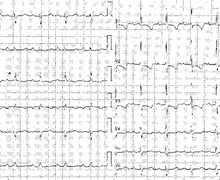

Permanent AF is a condition in which a normal heart rhythm can't be restored with treatment. It may stop on its own, or it can be stopped with treatment. Persistent AF is a condition in which the abnormal heart rhythm continues for more than a week. Persistent Atrial Fibrillation (I48.1 CC) They stop within about a week, but usually in less than 24 hours. In paroxysmal (par-ok-SIZ-mal) atrial fibrillation (AF), the faulty electrical signals and rapid heart rate begin suddenly and then stop on their own. The most recent clinical definitions of afib are: This coding quandary leaves the coder querying the physician each time atrial fibrillation is not specified. I48.9 Unspecified atrial fibrillation and atrial flutter.The ICD-10 Alphabetic Index shows the following tabular entries for atrial fibrillation: Developing clinical definitions will assist in the physician query process going forward but be sure physicians are involved and agree with your plan.Įxample- New codes for atrial fibrillation are without definition. Many facilities are developing clinical definitions regarding new terms and descriptive diagnostic modifiers. Do we query or not query? We must decide. Doctors diagnose af using family and medical history, a physical exam, and a test called an electrocardiogram (ekg), which looks at the electrical waves your heart makes.How are coders and CDI specialists to know what do do? Well again, it all goes back to the physician. In many patients, it can also cause chest pain, heart attack, or heart failure. palpitations - an abnormal rapid heartbeatĪf can lead to an increased risk of stroke.The cause is a disorder in the heart's electrical system.often, people who have af may not even feel symptoms. Atrial fibrillation (af) is the most common type of arrhythmia. An arrhythmia is a problem with the speed or rhythm of the heartbeat.An arrhythmia in which minute areas of the atrial myocardium are in various uncoordinated stages of depolarization and repolarization instead of intermittently contracting, the atria quiver continuously in a chaotic pattern, causing a totally irregular, often rapid ventricular rate.It is caused by abnormal impulse generation In such case, blood cannot be effectively pumped into the lower chambers of the heart (heart ventricles). Abnormal cardiac rhythm that is characterized by rapid, uncoordinated firing of electrical impulses in the upper chambers of the heart (heart atria).
#PERSISTENT ATRIAL FLUTTER ICD 10 CODE#
On the ecg it is described by the replacement of consistent p waves by rapid oscillations or fibrillatory waves that vary in size, shape, and timing, associated with an irregular, frequently rapid ventricular response when atrioventricular conduction is intact. 80 codes in list I49, ICD-10, other cardiac arrhythmias I49.0, ICD-10, ventricular fibrillation and flutter I49.1, ICD-10, atrial premature depolarization. This site is dedicated exclusively to helping you look up ICD-10 codes, quickly access the codes you use most, and become more comfortable with the new code set in general. Finally, patients were identified with an admission code of AF (ICD-10. Instead of intermittently contracting, the atria quiver continuously in a chaotic pattern, causing a totally irregular, often tachycardia ventricular rate. Based on this data, the CHADS2- and CHA2DS2VASc-score was calculated for each patient. A supraventricular arrhythmia characterized by uncoordinated atrial myocardium activation due to multiple reentry circuits with consequent deterioration of atrial mechanical function.On the ecg it is described by the replacement of consistent p waves by rapid oscillations or fibrillatory waves that vary in size, shape, and timing, associated with an irregular, frequently rapid ventricular response when atrioventricular conduction is intact Fib in the past but now NSR and taking no medication to maintain NSR ICD-10 Code Description CC or MCC I48.0 Paroxysmal atrial fibrillation - I48. Instead of intermittently contracting, the atria quiver continuously in a chaotic pattern, causing a totally irregular, often tachycardia ventricular rate. The rhythm disturbance originates above the ventricles A disorder characterized by a dysrhythmia without discernible p waves and an irregular ventricular response due to multiple reentry circuits.


 0 kommentar(er)
0 kommentar(er)
